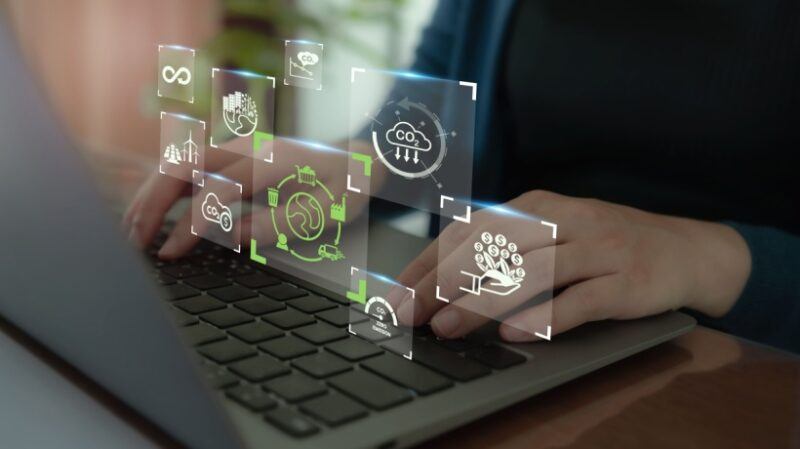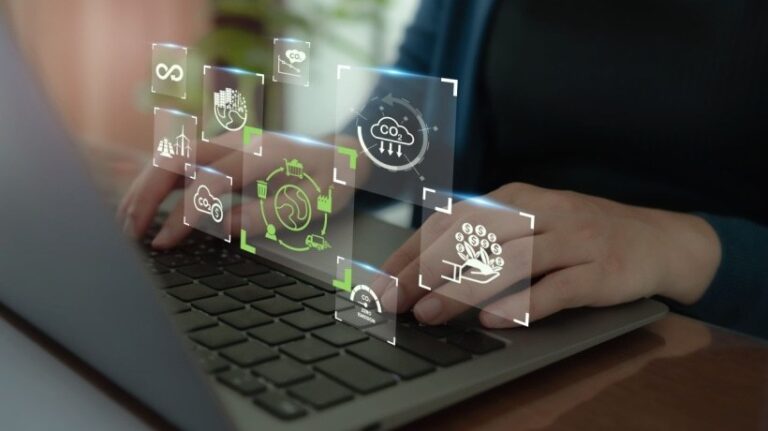
Net Zero’s future digital learning
Climate change is one of the biggest challenges for our generation, and the global pledge to reach net-zero emissions by the middle of the century is driving change across the board. Governments, businesses and society are united to reduce emissions and achieve sustainable decisions. However, achieving these ambitious goals requires more than just a change in awareness, skills and behavior on a global scale, and more than technology and policy. That’s where digital learning comes into play.
By sharing learning, reskills, and knowledge on a large scale, digital learning can enhance the means by which organizations and individuals can act efficiently while grasping their contributions to the Net Zero Pass. Let’s take a look at how digital learning can help accelerate global sustainability efforts.
1. Increased awareness of climate and sustainability issues
For most workers, stakeholders and citizens, the term “net zero” remains theoretical. Digital learning could fill this gap by providing simple, interactive and informative content that outlines whether Net Zero is important and how it can help certain industries and individuals achieve emission reductions.
Microlearning modules, gaming learning, and interactive infographics can help you understand complex subjects such as carbon accounting, renewable energy, or sustainable supply chains. These materials can bring climate literacy to the mainstream, ensure sustainability goals are not isolated within leadership groups, and ensure that they are understood by the workforce and society as a whole.
2. Increase your workforce and reskill
A low-carbon economy requires a green skilled workforce with knowledge of renewable energy technologies, managers who can develop sustainable business projects, and many other green jobs. The International Labour Organization (ILO) calculates that by 2030 the green economy will be able to create 24 million new jobs worldwide, but only if you have the right skills.
Digital learning provides the scalability and flexibility needed for quick reskilling. Online certifications, simulations, and courses allow professionals to acquire new skills without having to quit their job. for example:
Factory workers can train them in energy-saving production techniques. Logistics personnel can learn how to route optimization to reduce fuel usage. Executives can study ESG frameworks and sustainable funding.
By integrating sustainability-oriented training into staff development programs, businesses ensure that employees develop in line with net zero standards.
3. Promoting behavioral change
Policy and technology will not help us achieve net zero without deep changes in behavior at the organizational and individual level. Digital learning is particularly well suited to bring about such change through an individualized learning journey that connects people and practices.
For example, scenario-based learning may explain the effects of wasted energy habits on employees compared to environmentally friendly. Gamification could encourage workers to complete sustainability challenges, such as reducing paper consumption and stimulating green transportation. These have put sustainability into their daily choices and built long-term behavioral modifications.
4. Sharing global knowledge and best practices
Climate change is a cross-border issue that requires cooperation. Digital platforms allow you to share knowledge between governments, industry and academia around the world. Webinars, online forums and virtual workshops bring experts and learners across the region to share best practices such as renewable energy, carbon capture, and sustainable agriculture.
This knowledge transfer will allow most climate-disordered developing economies to have access to the same learning materials as developed countries. This equalization of knowledge accelerates the world’s shift to net zero while promoting inclusiveness.
5. Compliance and reporting support
As governments and investors demand transparent reporting of sustainability performance metrics, organizations are increasingly being fine-tuned to report in accordance with guidelines and regulations such as the Paris Agreement GRI (Global Reporting Initiative) and the TCFD (Trade Force on Climate-Related Financial Disclosures).
E-learning solutions can train employees with compliance processes, environmental disclosure guidelines and green purchasing methods. By providing the team with the knowledge they need, organizations can not only comply with regulations, but also increase stakeholder credibility.
6. Reduce Learning’s carbon footprint
Ironically, traditional in-person training tends to involve large carbon costs through travel, accommodation and paper materials. Digital training addresses this directly by providing training remotely. Online learning platforms eliminate the logistical needs of physical resources and reduce emissions while continuing to provide high-quality education. When integrated with technologies such as AI-powered personalization and VR-based immersive learning, digital training is not only more environmentally friendly, but also more interesting and effective.
7. Cultivating a culture of sustainability
The most effective application of Digital Learning is its ability to codify sustainability in an organizational culture. E-learning solutions that go beyond compliance and technical training can promote environmental management and social responsibility values at all levels of the enterprise. By making sustainability training a continuous process rather than an episode process, organizations cultivate a culture that believes there is freedom for employees to innovate, take initiative, and connect daily work to the overall cause of daily work reaching net zero.
Conclusion
Meeting global net zero emissions is not a technical or policy challenge. This is a challenge for people who demand awareness, skills and actions. Digital learning is particularly well suited to widen knowledge gaps, retraining the workforce, promoting sustainable action, and making critical information available from around the world.
With governments and organizations making ambitious climate commitments, digital learning investments are no longer a choice, but a must-have for strategy. Through the use of eLearning, we not only speed up the shift towards a low-carbon economy, but also take a journey to zero that is inclusive, scalable and meaningful for future generations.
Hexalearn Solutions Private Limited
ISO Certified Learning & Software Solutions Company.


